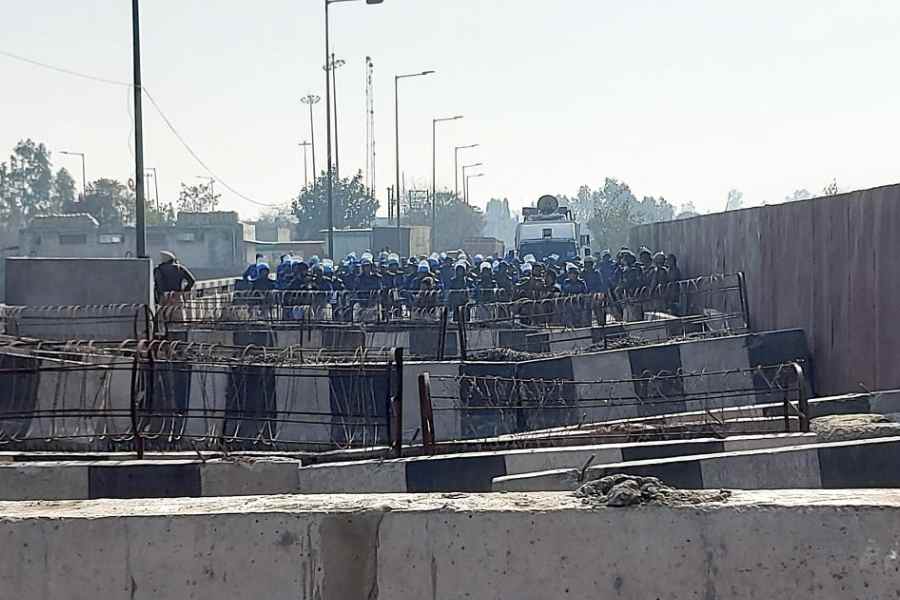Dug-up roads; barbed wire and iron spikes; layers of barricades.
The “security arrangements” at Delhi’s borders ahead of the February 13 “Delhi Chalo” by farmers are a throwback to the fortifications Delhi police had set up three years ago to check another farmers’ march.
That yearlong struggle of 2020-21 — mainly by farmers from Punjab, Haryana and Uttar Pradesh who had gathered at Delhi’s border points of Singhu, Tikri and Ghazipur — succeeded in getting the Centre to withdraw three farm laws.
This march, organised by around 200 farmer unions, is chiefly against the government’s failure to fulfil one of the promises made during that agitation — a law guaranteeing minimum support prices (MSPs) for a raft of crops.
A large number of farmers from the same three states are expected to march towards Delhi on Tuesday.
BJP-ruled Haryana has sealed its border with Punjab — via which the farmers can reach Delhi — at Shambhu near Ambala, using concrete blocks, three layers of nails on the roads, sandbags and barbed wire. Anti-riot vehicles have been deployed and mobile services suspended in several districts.
Farmer leader Jagjit Singh Dallewal from the Samkyukta Kisan Morcha, an umbrella body of farm unions leading the protests, accused Haryana of “creating terror” and asked: “Is this democracy?”
BJP-ruled Uttar Pradesh too has barricaded its borders with Delhi at many places and deployed police and paramilitary in anti-riot gear.
Congress leader Priyanka Gandhi Vadra shared a video of barricades and nails laid on roads at certain points near Delhi’s borders and attacked Prime Minister Narendra Modi.
“Is laying thorns-nails in the path of farmers ‘amritkaal’ or ‘anyaykaal’?” she posted on X.
“This insensitive and anti-farmer attitude had cost the lives of 750 farmers (during the 2020-21 agitation). Working against farmers and not even allowing them to raise their voice – what kind of government does this?”
She went on: “The promise made to the farmers was not fulfilled – neither was the MSP law made nor was farmers’ income doubled --if farmers do not come to the government of their own country, where will they go?
“Mr Prime Minister! Why such behaviour with the country’s farmers? Why don’t you fulfil the promises made to farmers?”
The Delhi police on Sunday banned assemblies in the capital’s Northeast district. “We have imposed Section 144 of the CrPC (prohibitory orders),” an order issued by the deputy commissioner of police (Northeast) said.
“Information has been received that some farmer organisations have given a call to their supporters to gather/ march to Delhi on February 13 for their demands of law on MSP. No one will be allowed to breach law and order situation.”
A Delhi police officer said: “We are in contact with our counterparts in Haryana, Punjab and Uttar Pradesh and have fortified the interstate borders to deal with any law-and-order situation.”
He added: “The borders will have multi-layer security checkpoints. Vehicles entering the capital will be checked thoroughly.”
In Haryana, iron sheets have been installed along both flanks of a highway leading to Delhi to prevent protesters from throwing the police barricades off the road. Water cannons and the riot-control Vajra vehicles have been stationed, and the dry floodplains of the Ghaggar have been dug up or had water released into them.
The Haryana police have also fortified the state’s borders with Punjab in Jind and Fatehabad. In Fatehabad, concrete blocks and spike strips have been placed on a road in the Jakhal area. The Tohana border has been “secured” with sand-laden containers, concrete barricades and three layers of nails on the road.
Mobile Internet and bulk SMS services have been suspended in seven Haryana districts -- Ambala, Kurukshetra, Kaithal, Jind, Hisar, Fatehabad and Sirsa -- from February 11 to 13.
Dallewal, the farmer leader, said: “We are ready for talks and will never run away from dialogue.”
He added: “On one hand, talks are on with the Centre and on the other, the state government is creating terror. What (Haryana) is doing is unfortunate and condemnable. Why is the government scared? Huge barricading is being done. Is this democracy?”
Dallewal said in a video message: “If the situation turns bad, it will be the responsibility of the (Manohar Lal) Khattar government (in Haryana).”
Besides legally guaranteed MSPs based on the Swaminathan Commission’s formula, the farmers also want pensions for themselves and farm labourers, farm debt waivers and the withdrawal of police cases against the 2020-21 agitators.
They have also demanded “justice” for the victims of Lakhimpur Kheri, where a car carrying a BJP leader’s son allegedly mowed down four protesting farmers and a journalist.
In February 2021, too, the Delhi police had dug up roads and planted iron rods and spikes between two rows of cement barriers on a flank of the highway at the Singhu border.
This was done to restrict the flow of people and supplies to the farmers, and prevent the agitators from marching into Delhi.











